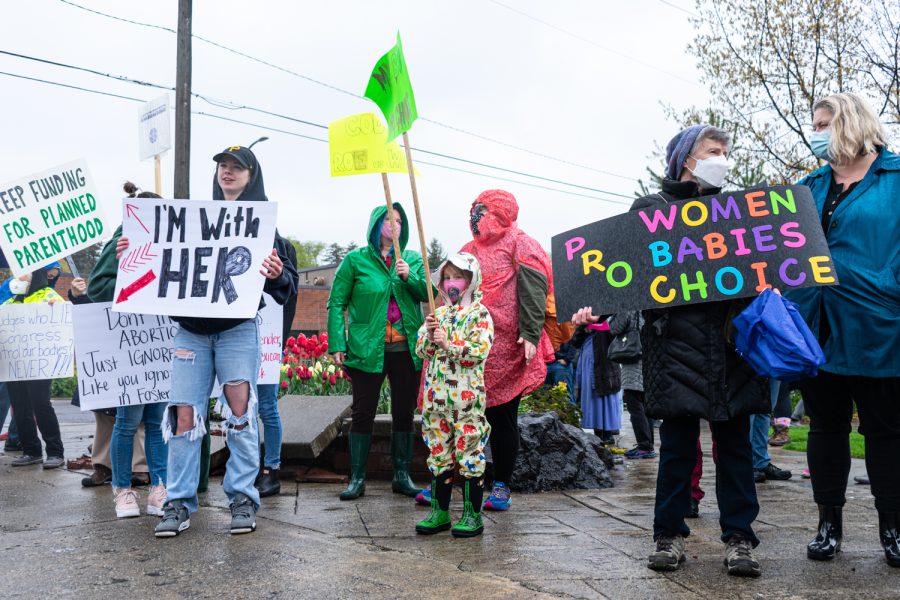‘I have power over my body. I will not be controlled’
Trigger law will go into effect in Idaho; justices, students worry court will revisit rights to contraception, gay marriage
Alana Gray, the youngest rally attendee, raises her poster alongside Mary Hogan (left) and Beth DeWeese (right) at the Women’s March Foundation’s Bans Off Our Bodies rally in Pullman, May 14.
June 27, 2022
Editor’s note: One of the sources will be identified only by their middle name, per their request.
When 20-year-old Frances Haycock learned the Supreme Court overturned Roe v. Wade Friday morning, her stomach dropped, and she began to cry.
Several hours later, she helped lead nearly 200 people in a march to the Latah County Courthouse, yelling at the top of her lungs and singing a hymn from the Unitarian Universalist Church of the Palouse, she said.
“I have power over my soul, and I have power over my body. I will not be controlled,” she said.
Simply being a woman is terrifying, she said. At the Bans Off Our Bodies Decision Day Action rally, Haycock turned her fear of a post-Roe v. Wade world into action, leading the chant, “stand up, fight back.”
“It was powerful to hear just the strong voices of so many people ringing out across from the courthouse,” she said. “That’s when I turned around, and I saw a couple of gals crying and screaming, seeing their fear and their anger manifest into something powerful.”
Forty-nine years after Roe v. Wade was initially codified into law and 30 years after Planned Parenthood of Southeastern Virginia v. Casey reaffirmed the case, the Supreme Court has overturned these precedents. With a 5-4 decision, the court no longer upholds the federal right to an abortion, according to the Supreme Court’s syllabus.
The court made its decision after ruling on Dobbs v. Jackson Women’s Health Organization, which examines the constitutionality of Mississippi’s Gestational Age Act, according to CNN. The act bans abortion after 15 weeks with the exception of medical emergencies or severe fetal abnormality.
The right to abortion care will now be determined by the states, according to the court’s syllabus.
Melanie Varvaroi, junior kinesiology major and member of Students for Life at WSU, said the decision to overturn the case is a “baby step” in the right direction.
“Just like all of us here on this planet, no matter where our location is, we all have a right to life. No one has the ability to take our life away as humans, morally [and] ethically,” she said.
Women often face societal pressure to have an abortion and are told they cannot get their degree or pursue a career with a child, but adoption and childcare are valid alternatives, Varvaroi said. Although women may not be ready to have a child, they may face depression, anxiety and – in some cases – hemorrhaging as a result of abortion.
Varvaroi said abortion care for ectopic pregnancies, in which the fetus is not viable, is natural, whereas abortion is not.
Haycock said the court’s decision was never about saving fetuses; it was about controlling women, transgender and non-binary people with uteruses in the U.S.
“It’s really terrifying to have people in our government that have decided that I don’t have the rights to my body anymore,” Haycock said.
Before the Supreme Court’s ruling, 13 states implemented “trigger laws,” in which abortion bans are immediately effective or will be official in 27 days, following the court’s decision, according to the Guttmacher Institute. In Louisiana, Kentucky and South Dakota, the right to have an abortion was immediately banned, with few exceptions, after the court’s ruling.
Haycock said this will create barriers for low-income individuals who cannot afford transportation to other states for an abortion.
Already, without easy access to abortion care, an estimated 4.7–13.2% of maternal deaths occur from unsafe abortions each year, according to the World Health Organization. In developed countries, 30 women die for every 100,000 unsafe abortions.
Although abortion care is still legal in Washington state, it will no longer be a protected right in Idaho, a mere 14 minutes from WSU, according to the Guttmacher Institute.
Signed in 2020, the trigger law states that anyone who provides or attempts to provide an abortion in Idaho will be charged with a felony and serve two to five years in prison. The exception to this law is when a pregnant individual’s life is in danger or they are a victim of rape or incest and have reported the incident to law enforcement, according to the Guttmacher Institute.
Healthcare professionals’ licenses will be suspended for six months after their first offense, and their licenses will be revoked after their second, according to the Guttmacher Institute.
On Monday, Planned Parenthood Great Northwest, Hawaii, Alaska, Indiana, Kentucky filed a lawsuit against the state of Idaho over its trigger law, which allegedly violates residents’ rights under the state Constitution and is difficult for physicians to interpret, according to Associated Press News.
Although Varvaroi believes women who have an abortion should not be penalized, she said health care professionals should face consequences for aiding women in this procedure in states where abortion is illegal.
“When it becomes illegal, and a doctor knows that it is illegal, and they still do it, then that is a violation of the law and the principles and morals of that doctor and the contract that they signed to be a healthcare provider,” she said.
Keanu (she/they), freshman environmental and ecosystem sciences major, said they are not surprised Idaho enacted a trigger law, but they are infuriated all the same.
“That type of erosion of rights kind of sets a really weird and dangerous precedent for other things,” she said. “The government can force you to carry a child to term. It’s not a huge stretch to say, well, if they have the power to do that, can they force you to have a kid in the first place? Can they move forward with banning abortion as a stepping stone? It’s just another way to restrict U.S. citizens and gain more power.”
These restrictions cause women-centered technology, like period-tracking applications, to become a liability. If pregnant individuals have an abortion illegally, law enforcement could request this information or find it and use it as evidence of an abortion, Keanu said.
Liberal justices are concerned that conservative members of the Supreme Court may not stop at overturning Roe v. Wade and reconsider other established constitutional rights as well, according to Politico.
Justice Clarence Thomas suggested the court reexamine Obergefell v. Hodges, Griswold v. Connecticut and Lawrence v. Texas, according to the the court’s opinion. These cases cover the right to same-sex marriages, the use of contraceptives and sodomy, respectively.
Justice Samuel Alito wrote that the decision regarding Roe v. Wade should not cast doubt on previous cases, according to Politico.
Keanu, who is gender nonconforming, is worried non-binary people’s rights may be at risk if the Supreme Court eventually decides to revisit these cases.
“It would probably be good for me to know a second language if I ever needed to move out of the country,” they said. “The fact that I have to think about stuff like that is pretty scary. It’s terrifying and anxiety-inducing.”
To show that many citizens do not stand for the government taking away their rights, Haycock said she encourages people to write to their local representatives, donate to Planned Parenthood and Northwest Access Abortion Fund and join demonstrations.
“If you’re not a straight, white, cisgender, wealthy man in this country, your rights are in jeopardy,” she said.










